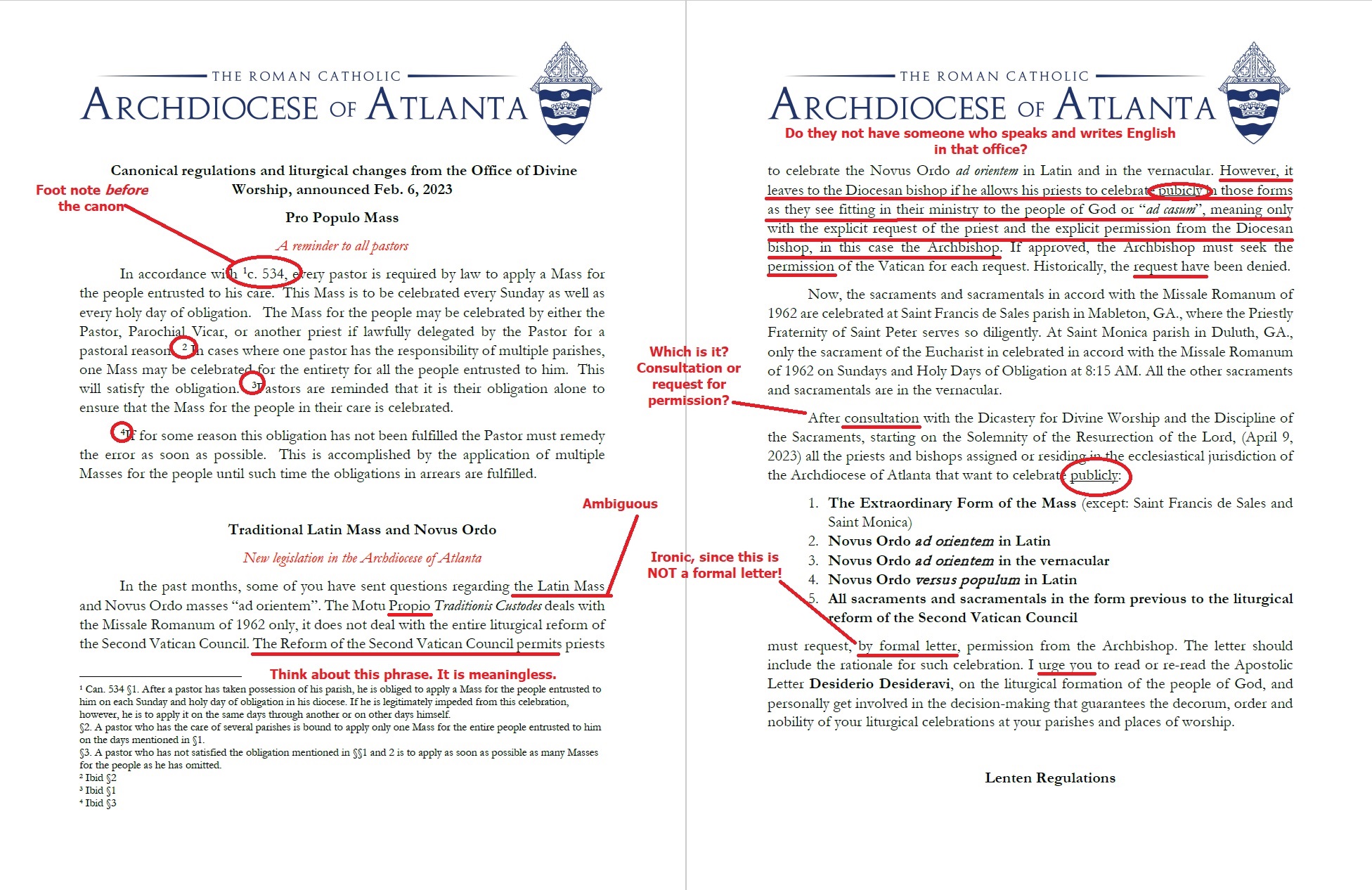 A note to the priests and people of the Archdiocese of Atlanta, where someone in the chancery is trying to bully you into submission.
A note to the priests and people of the Archdiocese of Atlanta, where someone in the chancery is trying to bully you into submission.
Someone whom I gather is the “priest secretary” to the Archbishop of Atlanta, and who is also the director of liturgy for that archdiocese, sent to the priests of the archdiocese a memo about: “Canonical regulations and liturgical changes from the Office of Divine Worship, announced Feb. 6, 2023”. Yes, “Feb.” in the title.
The memo is riddled with errors of format, grammar, spelling, law and reason.
For example, there are numerous misspellings. Footnote numbers are placed before the item cited. The syntax of one of the run-on sentences is so scrambled that it is hard to understand even what the writer was attempting to say.
It also is not signed by anyone. Instead there is given only an email address. I looked it up on the archdiocesan website.
The memo says: New legislation in the Archdiocese of Atlanta.
The first part is about “pro populo” Masses. It isn’t our concern, though it is a mess.
For something to be legislation, it has to be issued in the proper form. This embarrassing memo has none of that.

There’s more, concerning other matters. This is enough.
Here is the text as it appears in the memo.
Traditional Latin Mass and Novus Ordo
New legislation in the Archdiocese of Atlanta
In the past months, some of you have sent questions regarding the Latin Mass and Novus Ordo masses “ad orientem”. The Motu Propio Traditionis Custodes deals with the Missale Romanum of 1962 only, it does not deal with the entire liturgical reform of the Second Vatican Council. The Reform of the Second Vatican Council permits priests to celebrate the Novus Ordo ad orientem in Latin and in the vernacular. However, it leaves to the Diocesan bishop if he allows his priests to celebrate pubicly in those forms as they see fitting in their ministry to the people of God or “ad casum“, meaning only with the explicit request of the priest and the explicit permission from the Diocesan bishop, in this case the Archbishop. If approved, the Archbishop must seek the permission of the Vatican for each request. Historically, the request have been denied.
Now, the sacraments and sacramentals in accord with the Missale Romanum of 1962 are celebrated at Saint Francis de Sales parish in Mableton, GA., where the Priestly Fraternity of Saint Peter serves so diligently. At Saint Monica parish in Duluth, GA., only the sacrament of the Eucharist in celebrated in accord with the Missale Romanum of 1962 on Sundays and Holy Days of Obligation at 8:15 AM. All the other sacraments and sacramentals are in the vernacular.
After consultation with the Dicastery for Divine Worship and the Discipline of the Sacraments, starting on the Solemnity of the Resurrection of the Lord, (April 9, 2023) all the priests and bishops assigned or residing in the ecclesiastical jurisdiction of the Archdiocese of Atlanta that want to celebrate publicly:
1. The Extraordinary Form of the Mass (except: Saint Francis de Sales and Saint Monica)
2. Novus Ordo ad orientem in Latin
3. Novus Ordo ad orientem in the vernacular
4. Novus Ordo versus populum in Latin
5. All sacraments and sacramentals in the form previous to the liturgical reform of the Second Vatican Councilmust request, by formal letter, permission from the Archbishop. The letter should include the rationale for such celebration. I urge you to read or re-read the Apostolic Letter Desiderio Desideravi, on the liturgical formation of the people of God, and personally get involved in the decision-making that guarantees the decorum, order and nobility of your liturgical celebrations at your parishes and places of worship.
This deserves scorn.
The writer seems to think that “The Reform of the Second Vatican Council” is a… I dunno… a “thing”. Furthermore, “The Reform” didn’t “permit” priests to say Mass ad orientem and in Latin “and in the vernacular”. Priests were bound by the rubrics and law of the time. What “The Reform” “permitted” was that – according to future legislation – there could be some room given to the vernacular but that Latin should be retained.
Priests do not have to seek permission to follow canon law (which says that Mass is to be celebrated in Latin, or another approved language) and to follow the rubrics (which the pro-Conciliar Missale Romanum indicates as ad orientem worship).
This memo is an exercise in bullying. It has no legislative force. It is a list of wishes on the part of the writer. Here is what one of my canonist friends wrote about it.
What a load of draconian nonsense. But par for the course in this day and age. It deserves to be ignored as much as possible: force the Archbishop to act and discipline or remove priests for the “offense” of offering Mass according to the rubrics of the Missal. And, of course, they’re sowing the seeds that will force them, in ten years, to reap the whirlwind as the younger priests come of age. If the Archbishop can mandate versus populum, then his successor can mandate ad orientem by the same logic. This is 70’s Soviet ecclesiology. It should be obeyed with the same fervor that most folks in the waning days of Communism obeyed. In due time (I believe in short order) there will be our Gdansk shipyards, our Pan-European Picnic, and our tearing down of the Berlin Wall.
He makes a good point: IF the Archbishop can mandate X, the next Archbishop can mandate un-X. The same applies to draconian measures from Rome. If the order of law is ignored and if tradition is ignored, then chaos will be the result. Disobedience at every level will follow, and rightly so.
In the long run, people will suffer. Eventually they will say, “Enough!”


































Having worked for that archbishop when he was a Pastor in Atlanta, I can assure you he neither wrote or thought about any of that. Primarily because he is incapable of it. He is simply not intelligent enough to do that. The man neither understands the liturgy or canon law. He is simply following what someone told him to do and the person writing it I know very well and am ashamed that he would do such a “memo.” It should be ignored.
Maybe it could be sent back to the chancery, either a) corrected with lots of red ink, as you have done above (plus a mark out of 10 or a letter grade and “Please see me after class.”) or b) with a brief note asking for an English translation of the memo.
Sounds like someone has an axe to grind, but got very flustered and annoyed whilst doing it, or ran out of time before someone else came in the room.
Sad. Some members of the Church (including clergy and lay alike) should meditate more on death.
The truly embarrassing thing is how many men (priests, bishops, and archbishops) so easily allow themselves to be bullied, usually without putting up even a modicum of resistance.
“Ad casum”
Consulting my trusty dictionary,
“casus, ?s; m. – fall, overthrow; error; accident, chance, event; occasion; misfortune; danger; risk; death”
This is like ecclesial Mad Libs.
The priest should be reminded that DD mentions only the Mass, not sacramentals and the other sacraments, nor the breviary. Oops.
Unfortunately, any priest who responds to this letter with grammatical/canonical/liturgical correction will find himself in even deeper trouble. It has been my experience that people such as whoever issued this letter do not like to be corrected or contradicted, and will go after the culprit.
We can only hope that some lunatic has escaped from the local asylum and stolen stationery from the Archdiocese of Atlanta to issue delusional, monomaniacal edicts (again).
To bring a bit of levity with all of the liturgical… “stuff” going on; this letter reminds me of a story our pastor (head of the diocesan tribunal) likes to relate.
A few years ago, our vocations director was approached by some older priests, and some nearing retirement, about the younger men being ordained and heading to seminary. They asked, “Are we getting good men? Are they the best of the best?” To which father replied, “Well… I am not sure that has ever been the case.”
The first sentences of the letter imply that this heavy-handed ruling is only for the Mass that’s celebrated for the people of the parish. I believe every parish is required to have one Sunday Mass reserved for the intentions of the people.
So if we take this awful letter literally, any Mass with a specific intention (for a deceased relative, etc.) seems to be exempt.
Faithful priests should ignore this and do whatever they’ve been doing. If called on the carpet, they can point out this little fact.
Do you believe the part about the consultation with the Dicastery is a lie? Or do the numbered restrictions indicate (the nature of) the restrictions many fear will be announced at Easter?
@Uniaux
I think it’s a mispelling of “ad caseum”
The cheesier the better. Just like Bishop Bugnini and the Lonely Hearts Club Liturgists intended.
I’ve since forgotten the specifics of the occasion, but recall being told as a teenager that “fair” was a concept for games and legal transactions and such, but that life is most certainly never fair — if it were, countless idiots would get the severe, painful, and non-lethal beatings (so they could run the risk of a follow-up for remedial purposes!) they so richly deserve.
Now why would a poorly composed, poorly expressed letter from a poor writhing soul bring this memory to mind?
Well, it would appear that the Archbishop is either angling for a red hat, or someone higher than him forced this. The question then becomes, who forced the issue?
@Dave P.
That stuff is intentional. It is part of the power games — do something poorly just enough to get a troublemaker to speak up so you can go after them and make an example to keep the others in line.
1° This is said to be “New legislation in the Archidiocese of Atlanta.” This means not “universales” laws but “particulares” laws. Then c. 391 § 2 applies : “The Bishop exercises legislative power himself.” Nobody else. And particular laws have to be promulgated in the manner determined by the legislator (c. 8 § 2). This is not the case to my understanding. End of the matter.
2° “Ad casum” is very usual in canonical roman vocabulary and in every diocesan tribunal.
Evidently in Atlanta compliance with the Second Vatican Council requires permission of the bishop: “Nevertheless steps should be taken so that the faithful may also be able to say or to sing together in Latin those parts of the Ordinary of the Mass which pertain to them.” Sacrosanctum Concilium para. 54.
St. Monica’s in Duluth, Georgia is a beautiful, vibrant parish full of beautiful, caring people. The Latin Masses are well-done and very well-attended. The disinclination to make more such parishes must be due to the influence of the Evil One.